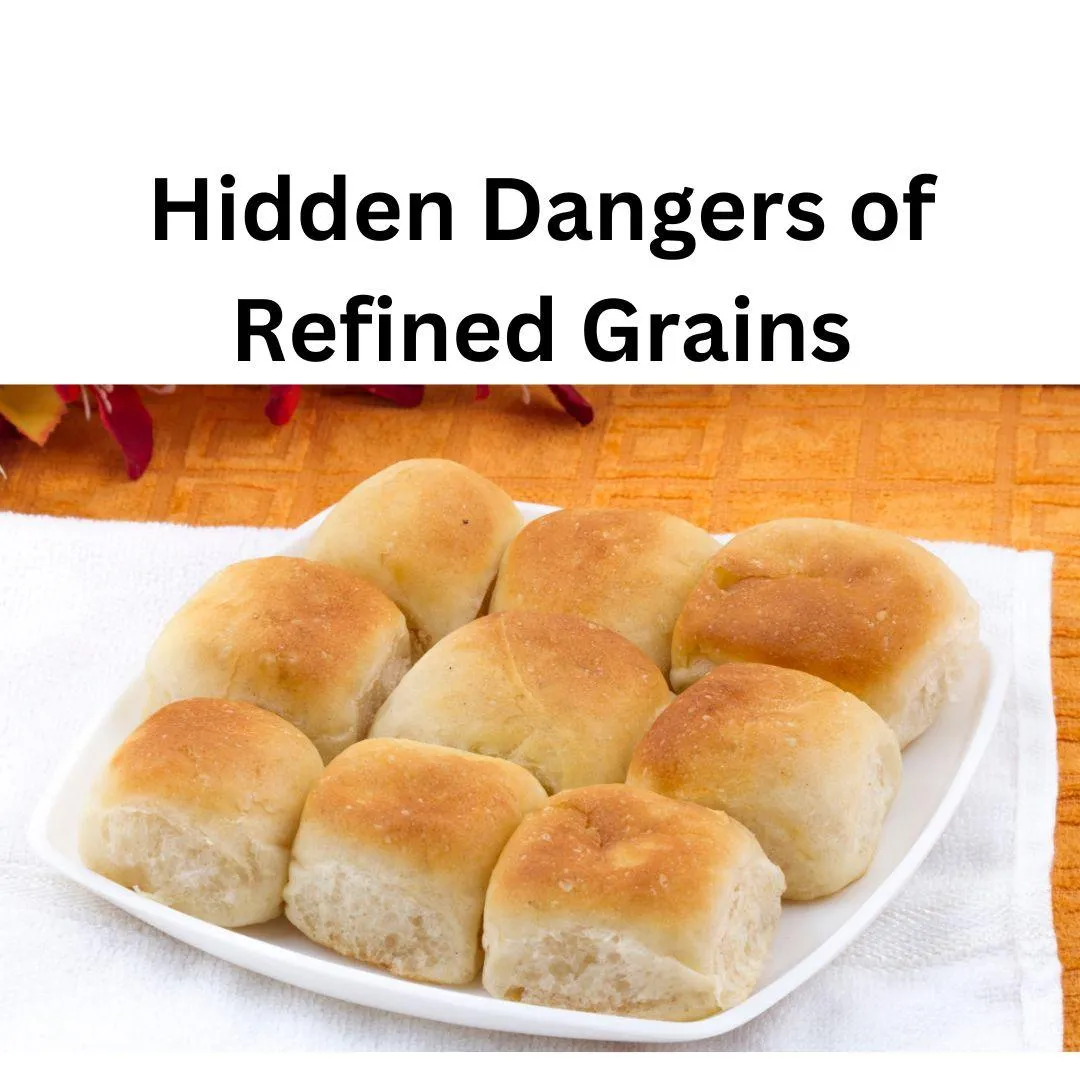Blog
Blog

The Hidden Dangers of Refined Grains and Healthier Alternatives
In today’s fast paced world, convenience often waylays health. One glaring example of this trade-off is the prominence of refined grains in modern diets. The flours used for most of our staple foods are processed differently from the flours used by our great grandparents when they cooked. These refined grains, used today, are found as the key ingredient in countless processed foods posing significant health risks.
Grains are a staple in many diets worldwide and play a crucial role in providing essential nutrients. However, their impact on health can vary depending on the type of grain, its processing, and individual dietary needs. This blog is a comprehensive discussion on how grains may affect health, focusing on their benefits and potential drawbacks.
What are refined grains?
Grains are seeds harvested from cereal crops such as wheat, rice, oats, and corn. They consist of three primary components:
Bran: The fiber-rich outer layer that contains B vitamins, minerals, and antioxidants.
Germ: The nutrient-dense core packed with healthy fats, vitamins, minerals and proteins.
Endosperm: The starchy middle layer that provides energy in the form of carbohydrates.
Refined grains undergo a milling process that removes the bran and germ, leaving only the endosperm. This process extends shelf life and improves texture but strips away most of the grain’s nutrients, including fiber, essential fatty acids, vitamins, and minerals.
What makes refined grains detrimental to your health?
Refined grains contribute to a variety of health problems. Seven of the most common include:
Spike in blood sugar levels: Refined grains are quickly digested an absorbed into the bloodstream, causing rapid spikes in blood sugar. This leads to a corresponding surge in insulin production, which can contribute to insulin resistance over time- a precursor to type 2 diabetes.
Hormonal imbalance: The frequent blood sugar and insulin spikes caused by refined grains can disrupt hormonal balance. Insulin resistance, often driven by a diet high in refined grains, can affect other hormones, including cortisol and sex hormones like estrogen and testosterone. This imbalance can lead to issues such as increased fat storage, mood swings, and even reproductive health problems.
Weight gain and obesity: The lack of fiber in refined grains means they do not promote satiety effectively. People often consume larger portions of refined grain products, leading to excessive calorie intake. Additionally, high blood sugar and insulin spikes can increase fat storage.
Heart disease: Studies have shown that diets high in refined grains are associated with an increased risk of cardiovascular diseases. Refined grains contribute to systemic inflammation, a key factor in the development of heart disease.
Digestive issues: The removal of fiber in refined grains compromises digestive health. Fiber promotes regular bowel movements and supports a healthy gut microbiome. Diets low in fiber can lead to constipation and other gastrointestinal disorders.
Nutrient deficiencies: Because the bran and germ are removed, refined grains are stripped of their natural nutrients. Although some refined grains are “enriched” with synthetic vitamins, they lack the full spectrum of nutrients found in whole grains.
Increased risk of chronic disease: Consumption of refined grains has been linked to a higher risk of chronic conditions such as metabolic syndrome, non-alcoholic fatty liver disease, and certain cancers, particularly colorectal cancer.
Common sources of refined grains in our diet include:
White bread
Pasta made from refined flour
White rice
Breakfast cereals
Pastries, cakes, and cookies
Crackers
Instant noodles
Snack foods like chips
Healthier grain alternatives: swapping refined grains for whole, minimally processed grains can significantly improve your health. Here are some nutrient dense alternatives:
Whole Grains
Whole grains retain the bran, germ and endosperm, offering a complete nutrient package. Examples include:
Brown Rice: a rich source of magnesium, selenium, and fiber.
Quinoa: A pseudo- grain packed with protein, iron and magnesium.
Barley: High in beta-glucans, which can lower cholesterol levels.
Oats: A heart-healthy grain loaded with soluble fiber.
Farro: An ancient grain with nutty flavor and high protein content.
Sprouted Grains
Sprouting grains enhances their nutritional value and digestibility. The process increases levels of vitamins, antioxidants, and amino acids. Sprouted options include:
Sprouted wheat
Sprouted brown rice
Sprouted rye
Gluten-Free Grains
For those with gluten sensitivities or celiac disease, gluten-free whole grains are excellent choices:
Buckwheat: High in antioxidants and minerals like manganese and magnesium.
Millet: A mild tasting grain rich in magnesium and phosphorus.
Sorghum: A versatile grain with a high antioxidant profile.
Ancient Grains
Ancient grains have remained largely unchanged by modern agriculture and are nutrient powerhouses:
Amaranth: A protein rich grain high in calcium and iron.
Teff: A tiny grain rich in protein and iron, commonly used in Ethiopian cuisine.
Kamut: Known for its buttery flavor and high zinc content.
Practical Tips for Transitioning to Healthier Grains
Making the switch to healthier grains doesn’t have to be daunting. Here are some tips to ease the transition:
Start small: Begin by replacing one refined grain product with a whole grain alternative. For instance, swap white rice for brown rice or while bread for whole grain bread.
Read labels carefully: This is very important, look for products labeled “100% whole grain”. Avoid items that list refined flours as the first ingredient.
Experiment with recipes: Incorporate whole grains into your meals by trying new recipes. For example, use quinoa in salads, oats in breakfast bowls, or barley in soups.
Cook in batches: Prepare whole grains in large quantities and store them in the fridge or freezer. This makes it easier to add them to meals throughout the week.
Choose naturally gluten free options: If you are avoiding gluten, experiment with grains like millet, sorghum, or buckwheat in place of refined gluten free products, which are often highly processed.
The Role of Whole Grains in a Balanced Diet
Whole grains are a crucial component of a balanced diet. They help us sustain our energy. The fiber in whole grains slows digestion, leading to a gradual release of energy.
They give us essential nutrients. Whole grains are rich in B vitamins, iron, magnesium, and antioxidants.
They support digestive health. The fiber supports gut health by promoting regularity and feeding beneficial gut bacteria.
They may reduce disease risk. Studies show that whole grains with bran and germ intact can lower the risk of heart disease, diabetes and certain cancers.
In conclusion, the dangers of refined grains cannot be overstated. From their contribution to chronic diseases to their lack of essential nutrients, they represent a significant challenge to modern health. By understanding the risks and embracing healthier alternatives, we can take meaningful steps toward better well-being. Choosing whole, sprouted, gluten-free, or ancient grains can provide the nutrients out bodies need to thrive and help us reclaim control over our diets. Start small, stay consistent, and watch as your health transform for the better.
Disclaimer:
This content is for informational and educational purposes only. It is not intended to provide medical advice or to take the place of medical advice or treatment from a personal health care professional. All viewers of this content are advised to consult their own qualified health professionals regarding specific health questions. Neither Vivien Murphy, or Elite Sexual Hormone Health takes responsibility for possible health consequences of any person or persons reading or following the information in this educations content. All viewers of this content, especially those taking prescription or over the counter medications should consult their medical providers before beginning any nutrition, supplement or lifestyle program.

Vivien Murphy
With over 35 years of experience in healthcare, I am a seasoned healthcare professional holding an APRN Nurse Practitioner degree in Family Practice with certification in Adult Acute Care. As a mother of four and an avid scuba diver, my personal encounter with menopause sparked my commitment to holistic healthcare. I faced a range of symptoms, from hot flashes and insomnia to heavy menstrual cycles that required multiple blood transfusions and eventually a hysterectomy. Disillusioned by conventional medicine's limitations, I explored innovative approaches like hypnotherapy, wellness coaching, and functional medicine. I am devoted to helping women navigate menopause gracefully, addressing root causes and creating customized treatment plans for vibrant health and optimal wellness.

The Hidden Dangers of Refined Grains and Healthier Alternatives
In today’s fast paced world, convenience often waylays health. One glaring example of this trade-off is the prominence of refined grains in modern diets. The flours used for most of our staple foods are processed differently from the flours used by our great grandparents when they cooked. These refined grains, used today, are found as the key ingredient in countless processed foods posing significant health risks.
Grains are a staple in many diets worldwide and play a crucial role in providing essential nutrients. However, their impact on health can vary depending on the type of grain, its processing, and individual dietary needs. This blog is a comprehensive discussion on how grains may affect health, focusing on their benefits and potential drawbacks.
What are refined grains?
Grains are seeds harvested from cereal crops such as wheat, rice, oats, and corn. They consist of three primary components:
Bran: The fiber-rich outer layer that contains B vitamins, minerals, and antioxidants.
Germ: The nutrient-dense core packed with healthy fats, vitamins, minerals and proteins.
Endosperm: The starchy middle layer that provides energy in the form of carbohydrates.
Refined grains undergo a milling process that removes the bran and germ, leaving only the endosperm. This process extends shelf life and improves texture but strips away most of the grain’s nutrients, including fiber, essential fatty acids, vitamins, and minerals.
What makes refined grains detrimental to your health?
Refined grains contribute to a variety of health problems. Seven of the most common include:
Spike in blood sugar levels: Refined grains are quickly digested an absorbed into the bloodstream, causing rapid spikes in blood sugar. This leads to a corresponding surge in insulin production, which can contribute to insulin resistance over time- a precursor to type 2 diabetes.
Hormonal imbalance: The frequent blood sugar and insulin spikes caused by refined grains can disrupt hormonal balance. Insulin resistance, often driven by a diet high in refined grains, can affect other hormones, including cortisol and sex hormones like estrogen and testosterone. This imbalance can lead to issues such as increased fat storage, mood swings, and even reproductive health problems.
Weight gain and obesity: The lack of fiber in refined grains means they do not promote satiety effectively. People often consume larger portions of refined grain products, leading to excessive calorie intake. Additionally, high blood sugar and insulin spikes can increase fat storage.
Heart disease: Studies have shown that diets high in refined grains are associated with an increased risk of cardiovascular diseases. Refined grains contribute to systemic inflammation, a key factor in the development of heart disease.
Digestive issues: The removal of fiber in refined grains compromises digestive health. Fiber promotes regular bowel movements and supports a healthy gut microbiome. Diets low in fiber can lead to constipation and other gastrointestinal disorders.
Nutrient deficiencies: Because the bran and germ are removed, refined grains are stripped of their natural nutrients. Although some refined grains are “enriched” with synthetic vitamins, they lack the full spectrum of nutrients found in whole grains.
Increased risk of chronic disease: Consumption of refined grains has been linked to a higher risk of chronic conditions such as metabolic syndrome, non-alcoholic fatty liver disease, and certain cancers, particularly colorectal cancer.
Common sources of refined grains in our diet include:
White bread
Pasta made from refined flour
White rice
Breakfast cereals
Pastries, cakes, and cookies
Crackers
Instant noodles
Snack foods like chips
Healthier grain alternatives: swapping refined grains for whole, minimally processed grains can significantly improve your health. Here are some nutrient dense alternatives:
Whole Grains
Whole grains retain the bran, germ and endosperm, offering a complete nutrient package. Examples include:
Brown Rice: a rich source of magnesium, selenium, and fiber.
Quinoa: A pseudo- grain packed with protein, iron and magnesium.
Barley: High in beta-glucans, which can lower cholesterol levels.
Oats: A heart-healthy grain loaded with soluble fiber.
Farro: An ancient grain with nutty flavor and high protein content.
Sprouted Grains
Sprouting grains enhances their nutritional value and digestibility. The process increases levels of vitamins, antioxidants, and amino acids. Sprouted options include:
Sprouted wheat
Sprouted brown rice
Sprouted rye
Gluten-Free Grains
For those with gluten sensitivities or celiac disease, gluten-free whole grains are excellent choices:
Buckwheat: High in antioxidants and minerals like manganese and magnesium.
Millet: A mild tasting grain rich in magnesium and phosphorus.
Sorghum: A versatile grain with a high antioxidant profile.
Ancient Grains
Ancient grains have remained largely unchanged by modern agriculture and are nutrient powerhouses:
Amaranth: A protein rich grain high in calcium and iron.
Teff: A tiny grain rich in protein and iron, commonly used in Ethiopian cuisine.
Kamut: Known for its buttery flavor and high zinc content.
Practical Tips for Transitioning to Healthier Grains
Making the switch to healthier grains doesn’t have to be daunting. Here are some tips to ease the transition:
Start small: Begin by replacing one refined grain product with a whole grain alternative. For instance, swap white rice for brown rice or while bread for whole grain bread.
Read labels carefully: This is very important, look for products labeled “100% whole grain”. Avoid items that list refined flours as the first ingredient.
Experiment with recipes: Incorporate whole grains into your meals by trying new recipes. For example, use quinoa in salads, oats in breakfast bowls, or barley in soups.
Cook in batches: Prepare whole grains in large quantities and store them in the fridge or freezer. This makes it easier to add them to meals throughout the week.
Choose naturally gluten free options: If you are avoiding gluten, experiment with grains like millet, sorghum, or buckwheat in place of refined gluten free products, which are often highly processed.
The Role of Whole Grains in a Balanced Diet
Whole grains are a crucial component of a balanced diet. They help us sustain our energy. The fiber in whole grains slows digestion, leading to a gradual release of energy.
They give us essential nutrients. Whole grains are rich in B vitamins, iron, magnesium, and antioxidants.
They support digestive health. The fiber supports gut health by promoting regularity and feeding beneficial gut bacteria.
They may reduce disease risk. Studies show that whole grains with bran and germ intact can lower the risk of heart disease, diabetes and certain cancers.
In conclusion, the dangers of refined grains cannot be overstated. From their contribution to chronic diseases to their lack of essential nutrients, they represent a significant challenge to modern health. By understanding the risks and embracing healthier alternatives, we can take meaningful steps toward better well-being. Choosing whole, sprouted, gluten-free, or ancient grains can provide the nutrients out bodies need to thrive and help us reclaim control over our diets. Start small, stay consistent, and watch as your health transform for the better.
Disclaimer:
This content is for informational and educational purposes only. It is not intended to provide medical advice or to take the place of medical advice or treatment from a personal health care professional. All viewers of this content are advised to consult their own qualified health professionals regarding specific health questions. Neither Vivien Murphy, or Elite Sexual Hormone Health takes responsibility for possible health consequences of any person or persons reading or following the information in this educations content. All viewers of this content, especially those taking prescription or over the counter medications should consult their medical providers before beginning any nutrition, supplement or lifestyle program.

Vivien Murphy
With over 35 years of experience in healthcare, I am a seasoned healthcare professional holding an APRN Nurse Practitioner degree in Family Practice with certification in Adult Acute Care. As a mother of four and an avid scuba diver, my personal encounter with menopause sparked my commitment to holistic healthcare. I faced a range of symptoms, from hot flashes and insomnia to heavy menstrual cycles that required multiple blood transfusions and eventually a hysterectomy. Disillusioned by conventional medicine's limitations, I explored innovative approaches like hypnotherapy, wellness coaching, and functional medicine. I am devoted to helping women navigate menopause gracefully, addressing root causes and creating customized treatment plans for vibrant health and optimal wellness.
Disclaimer: We understand that every individual's experience is unique and results may vary depending on various factors, such as attitude, adaptability, personal history, and overall health. For your safety and well-being, we highly recommend consulting your physician before beginning any program. At Elite Sexual Hormone Health, we do not diagnose, treat, or prescribe any medical or psychological disorders. We urge you to seek the care of a qualified physician or psychotherapist if you suffer from any psychological or medical disorder. Thank you for choosing Elite Sexual Hormone Health as your partner in your journey towards wellness.
© 2025, Elite Sexual Hormone Health. All rights reserved.
Privacy Policy | Terms of Service | Disclaimer
© 2025, Elite Sexual Hormone Health. All rights reserved.
Website by Hypnotherapy Accelerator




